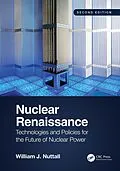Nuclear power is low carbon and reliable, but in recent years it has struggled to play a strong role in global plans for electricity generation in the 21st century. Many of those involved with nuclear power and environmental agencies see controlled expansion of nuclear plants as the most environmentally friendly way of meeting growing energy demands. In the UK policy makers must recognise concerns around severe accidents and radioactive wastes and balance these against the risks arising from other energy technologies. In addition, energy policy-makers must ensure that energy supplies remain affordable for all in society. How might new nuclear power stations help meet emerging policy needs?
This second edition of Nuclear Renaissance: Technologies and Policies for the Future of Nuclear Power continues to examine the future of nuclear power in the contexts of economics, environmental sustainability, and security of electricity supplies. Fully updated with the latest technologies and concerns, this comprehensive guide illustrates the technical challenges and opportunities facing nuclear power.
This semi-technical overview of modern technologies meets the growing interest from scientists, environmentalists, and governments in the potential expansion of nuclear power. Various countries are starting to announce plans for new nuclear plants, either to replace those being decommissioned, to provide additional power or to contribute to the decarbonisation of especially challenging industrial activities. In the 2020s many commentators, once again, point to a renaissance just beginning.
Nuclear Renaissance: Technologies and Policies for the Future of Nuclear Power is essential reading for physicists, engineers, policy-makers, researchers, energy analysts and graduate students in energy sciences, engineering and public policy.
Key features
- Fully updated throughout, with new content on topics including the latest developments in fission and fusion energy, the global financial crisis of 2008/2009, and the Fukushima-Daiichi nuclear accident.
- Accessible to readers without a formal education in the area
- Authored by an authority in the field
Autorentext
William Nuttall is Professor of Energy at the Open University. Much of his work has focussed on technology and policy issues of energy. He has had a leading role in studies devoted to particular energy-related materials including plutonium, helium, uranium, thorium and hydrogen and much of that work is on-going. He has extensive experience of matters relating to the peaceful uses of nuclear energy. Professor Nuttall has also published on cognate issues, such as hydrogen energy and the history of the UK nuclear deterrent. Professor Nuttall's career started in experimental physics and this technical background informs his interest in energy and technology issues. Professor Nuttall has much experience assisting the mainstream media with its reporting of energy issues. He has also acted as an advisor to the UK Government and the European Commission. He has also presented evidence to parliaments in London and elsewhere.
Inhalt
Part I. Introduction.
Chapter 1. Beginnings.
Chapter 2. Nuclear Renaissance: Progress and Prospects.
Part II. The Policy Landscape.
Chapter 3. Issues in Energy Policy.
Chapter 4. The Issues Facing New Nuclear Build.
Chapter 5. Nucelar Waste Management.
Part III. Nuclear Fission Technologies.
Chapter 6. Water-cooled Reactors.
Chapter 7. High-temperature Reactors.
Chapter 8. Advanced Fission Technologies and Systems.
Part IV. Nuclear Fusion Technologies.
Chapter 9. Fusion: An Introduction.
